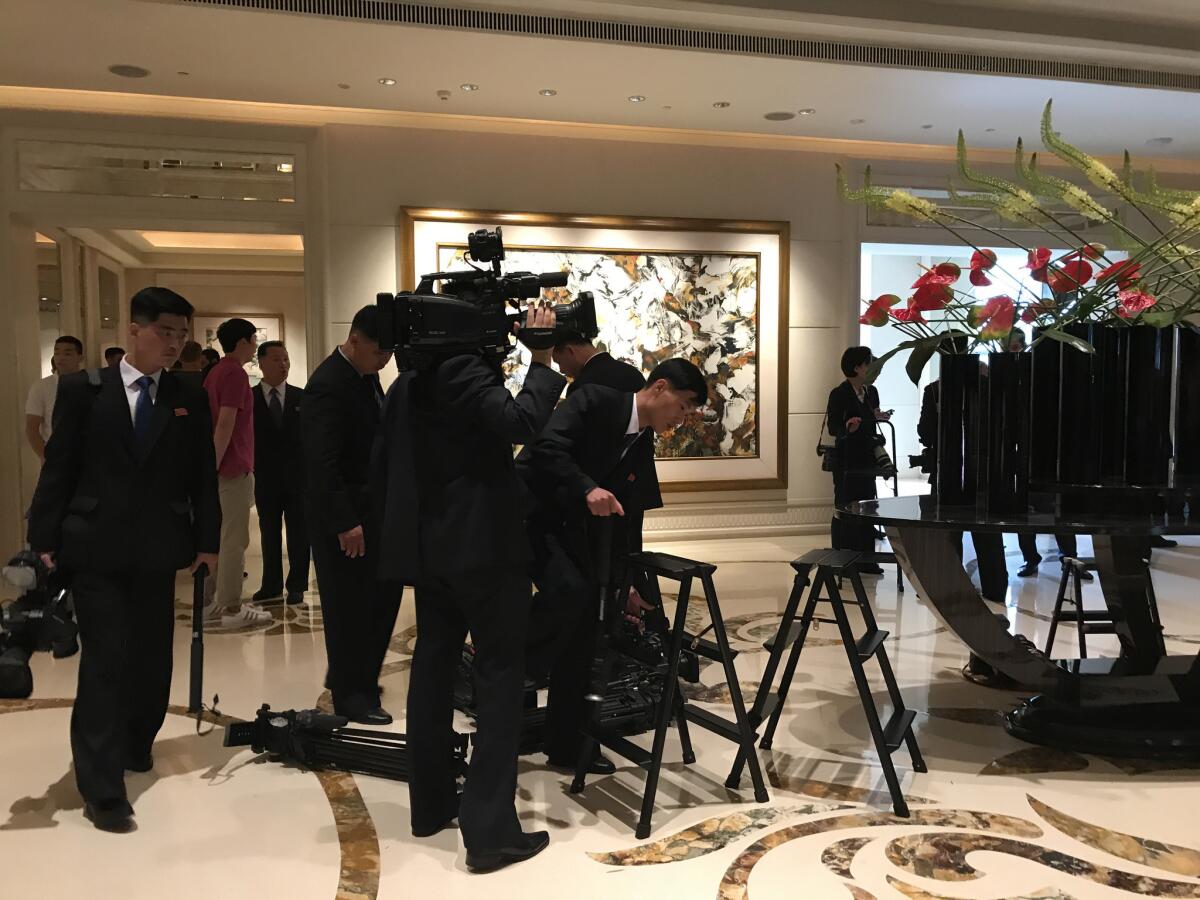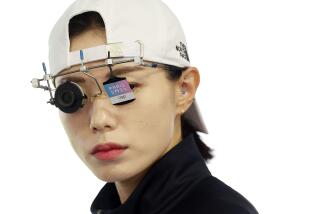I grew up in striking distance of North Korea’s artillery. Covering Kim’s summit with Trump was sobering and personal

- Share via
Reporting from Singapore — We stood arm’s length from each other in the tense St. Regis hotel lobby, two reporters who speak the same language waiting for the same thing.
The gulf between us was as vast as the demilitarized zone — laced with landmines and overgrown from 70 years of abandon — that separates North and South Korea.
He was a North Korean cameraman, traveling with a young tyrant to capture his stunning debut on the world stage, and I a South Korea-raised journalist working for an American newspaper.
I was a member of the international press corps that swarmed to Singapore to cover Tuesday’s summit between Kim Jong Un and President Trump — and to grab a glimpse of the nuclear-armed autocrat who controls a police state.
The reality-show-like theatrics and roller-coaster diplomacy before the summit were dizzying, and in the countdown to the unprecedented meeting, I felt like one of the Hollywood paparazzi staking out a major celebrity.
That was especially true my first morning in Singapore, when I walked up a service driveway to the luxury resort that would serve as the summit site, only to have hotel staff swiftly whisk me onto a golf cart and escort me back down the hill.
If I really thought about it, the stakes were sobering and personal, as they have been all my life. If war breaks out, my parents’ home in Seoul is in easy striking distance of North Korean artillery, and my brother and other military reservists would be called up to fight.
You grow numb to the risk, like living in an inner city where the occasional shooting and drug deals are just a fact of life. Technically, North and South Korea have been at war the entire time my parents and I have been alive. But less than an hour from the border, Seoul is one of the world’s most vibrant cities.
In that hotel lobby, though, as we waited for Kim, I was curious not about him and his nuclear weapons but about the half a dozen or so North Korean journalists who came with him.
They wore identical haircuts, dark black suits and red lapel pins bearing the faces of the dynastic dictator’s father and grandfather. They all worked for the government-run media, the only media allowed in North Korea.
Did they worry about war? What did they think of Kim and did they believe the propaganda they wrote about him? Did they think they’d ever see a free press in their closed-off home?
I admit I felt a strange camaraderie with them. I was excited to see a woman in the group, a photographer toting two large DSLRs. Not exactly equal representation, but a start, perhaps.
Several South Korean reporters who were also waiting in the lobby tried chatting them up and were met with stone-cold silence.
Then one of the dozens of security personnel guarding the lobby asked the North Korean cameraman to move back from the elevator banks. He lugged his heavy equipment over to where I stood, near the concierge desk.
We stood in an awkward silence, me sneaking glances at the man with curly hair and big eyes. I took a deep breath and broke the ice: It must be hot in that suit in Singapore’s heat, I said in Korean.
It was, he said sheepishly, in an unmistakable North Korean accent. The tropical humidity was getting to him. He asked if I was a reporter and I said yes.
For a few minutes, we shot the breeze, two journalists on an assignment of a lifetime.
He told me his father had worked in movies, so camerawork was natural for him. I said I thought his need to get close to the action seemed harder than mine, scribbling in my notebook in the corner.
No, he said, writing was much harder. We compared how long we’d been working, three years for him and 10 for me. I quietly deduced, based on his age, that he must have served in North Korea’s million-man army.
We didn’t talk about nuclear weapons or the two attention-grabbing leaders about to make history just by shaking hands, the first North Korean ruler and sitting U.S. president ever to do so.
I didn’t bring up press freedom in his country, ranked last in the world by Reporters Without Borders. In 2015, North Korea sentenced to death, albeit in absentia, four South Korean journalists who reviewed a book about emerging capitalism in the socialist state for “insulting” the nation.
He was soon called away by a man who seemed to be his boss. About half an hour later, after security made all bystanders in the lobby put away their smartphones, Kim emerged from the elevator and sauntered by in a path cordoned off by velvet ropes.
Afterward, a sweaty, nervous man was interrogated by hotel staff and a stern-looking North Korean official and forced to delete the photos he’d managed to sneak of Kim on his phone.
I snapped a photo of the police in riot gear after Kim exited the front doors. The North Korean official loudly demanded to see my phone, shaking his hand in my face.
I protested to the hotel staff and Singaporean government officials who seemed keen on pleasing their visiting VIP and turning the St. Regis into a slice of Pyongyang. I told them they would need a warrant to see my phone.
I eventually relented and showed a Singaporean official my photos to prove I had not snapped one of Kim, the North Koreans’ chief concern. He let me keep them, but it was intimidating and a bit humiliating, a fleeting hint at what life might be like in Kim’s North Korea.
Late the next night though, Kim stunned us all. Accompanied by Singapore officials, he ventured out to see some of the tourist sights, and videos and photos of him soon flooded social media. On an Instagram video that went viral, a South Korean man could be heard shouting to the dictator: Saranghaeyo. I love you.
During Tuesday’s summit, watching the live video feed at the White House press center, I spotted the North Korean cameraman jostling with American and international camera crews.
He was filming Kim, standing comfortably by a U.S. president, jarring images that would circulate the globe and solidify his rule back home in North Korea. And I never got to ask my questions.
[email protected] | Twitter: @vicjkim
More to Read
Sign up for Essential California
The most important California stories and recommendations in your inbox every morning.
You may occasionally receive promotional content from the Los Angeles Times.











